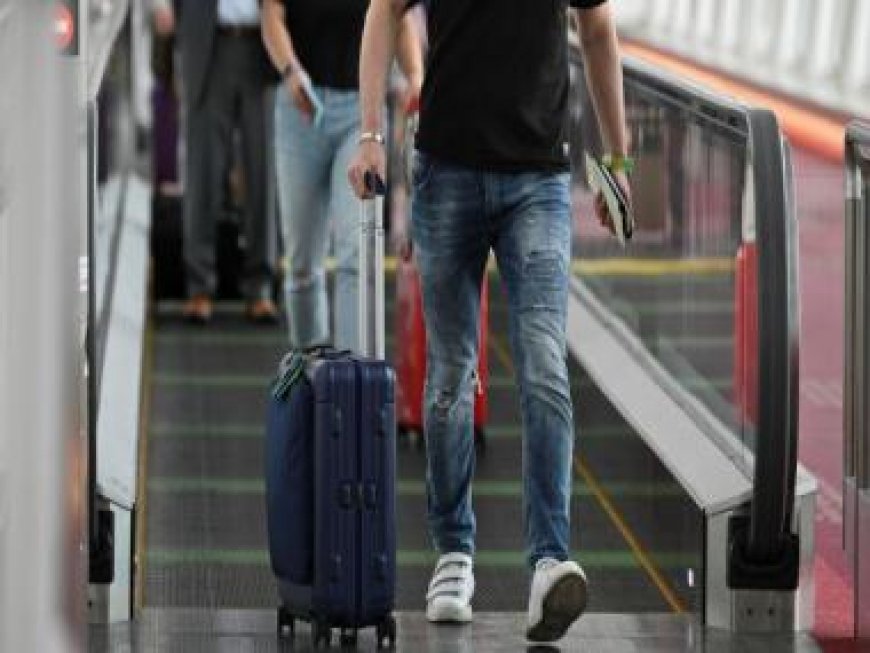No Baggage: Why Japan Airlines is encouraging flyers not to carry clothes
No Baggage: Why Japan Airlines is encouraging flyers not to carry clothes

Are you the kind of person who hates baggage? Do you like to travel light? You might want to plan a trip to Japan. You can now fly to the island nation luggage-free, courtesy of Japan Airlines. It has come up with a revolutionary plan that encourages flyers to leave bulky suitcases behind. So what will visitors wear? Rented clothes.
Starting on 5 July, Japan Airlines Co and trading house Sumitomo Corp have started an experiment that will give passengers the option to rent clothes during their stay in the country. The initiative aims to promote sustainable tourism while offering convenience to travellers. By reducing the weight of each aircraft, the carrier hopes to cut fuel consumption and eventually reduce carbon dioxide emissions. For now, it’s just a trial that will continue until August 2024.
How can flyers rent clothes?
Passengers can pick outfits of their choice and size, keeping in mind seasonal needs, through a website before boarding a Japan Airlines plane.
Under the trial scheme known as “Any Wear, Anywhere”, all travellers need to pack are their undergarments and toothbrush. They can dump the big suitcases and rent outfits by season, size, formality and colours, according to a report in Financial Times (FT). People can select up to eight outfits about a month in advance for two weeks.
The wardrobe will have three sizes – small, medium and large –in different styles – smart, smart casual and mixed.
Also read: Perils of pollution: It’s time we stopped taking clean air for granted
How much will the clothes cost?
A set of clothes will cost anywhere between ¥4,000 to ¥7,000 (Rs 2,311 to Rs 4,044). Women have the option to pick tops including linen shirts and bottoms – trousers and ankle-length skirts during the summer months. A combination of five tops and three months will cost ¥5,000 (Rs 2,889) under the current pricing structure. Men travelling for a casual trip during winter could rent faded jeans, a hoodie and a cosy down jacket for ¥7000 (Rs 4043), reports FT.
The clothes will be sourced from the excess stock of retailers and second-hand garments collected by a parent company. Once flyers select their apparel, they will be delivered to the hotel or their accommodation before their arrival and will be collected at the end of the trip, laundered and recycled. If clothes are damaged, renters will have to pay up.

How will ditching suitcases help?
During the year-long initiative, data will be collected to study if there has been a reduction in the weight of baggage carried by passengers.
“With more and more people flying again after the Covid-19 pandemic, and with the recent emphasis in sustainability, there is a growing movement around the world to promote sustainable tourism,” said Japanese Airlines in a statement.
“Travellers increasingly desire to make more sustainable choices regarding their travel destinations, accommodations, transportation etc, they still lack sufficient options. For example, most travellers now enjoy eating at restaurants and staying at hotels at their destination, but they generally bring their own clothing from home.”
According to the “Any Wear, Anywhere” website, flying with 10 kg less weight in baggage could result in 7.5 kg reduction of carbon dioxide emissions. This is equivalent to not using a hairdryer for 78 days if it was used for an average of 10 minutes a day.
If the scheme is a success, Sumitomo may consider rolling it out to other carriers flying to Japan like American Airlines, British Airways, Cathay Pacific, and Malaysia Airlines.
Japan is seeing a rise in travellers after the pandemic and the initiative aims to cash in on that. In May, 1.9 million people visited the country, an increase of 1,191 per cent compared to the same month in 2022, according to Japan National Tourism Organisation data.
According to the government’s Japan Tourism Agency, visitors in the first three months of 2023 spent an average of ¥50,496 (Rs 29,237) on shopping alone, reports FT.

Is this scheme really environmentally friendly?
It is too early to say. While Sumitomo hopes that the scheme will help to cut down on clothing waste too, tackling the problem of so-called fast fashion, renting will also come with its impact on the environment.
Laundering and packaging can lead to water pollution and the use of plastics and detergents, reports The Indian Express. Transporting clothes to passengers will lead to the consumption of some amount of energy.
Aviation is responsible for 2.5 per cent of global CO2 emissions. The European Commission predicts that by the middle of the 21st century, demand for flying could increase aviation’s greenhouse gas emissions by upwards of 300 per cent over 2005 levels if no drastic measures are taken to reduce them, according to a report published by the World Economic Forum.
The aviation industry has adopted the goal of reaching net-zero carbon emissions by 2050. The Japan Airlines move ‘rent clothes’ scheme is a small step in this direction.
With inputs from agencies
What's Your Reaction?

























































